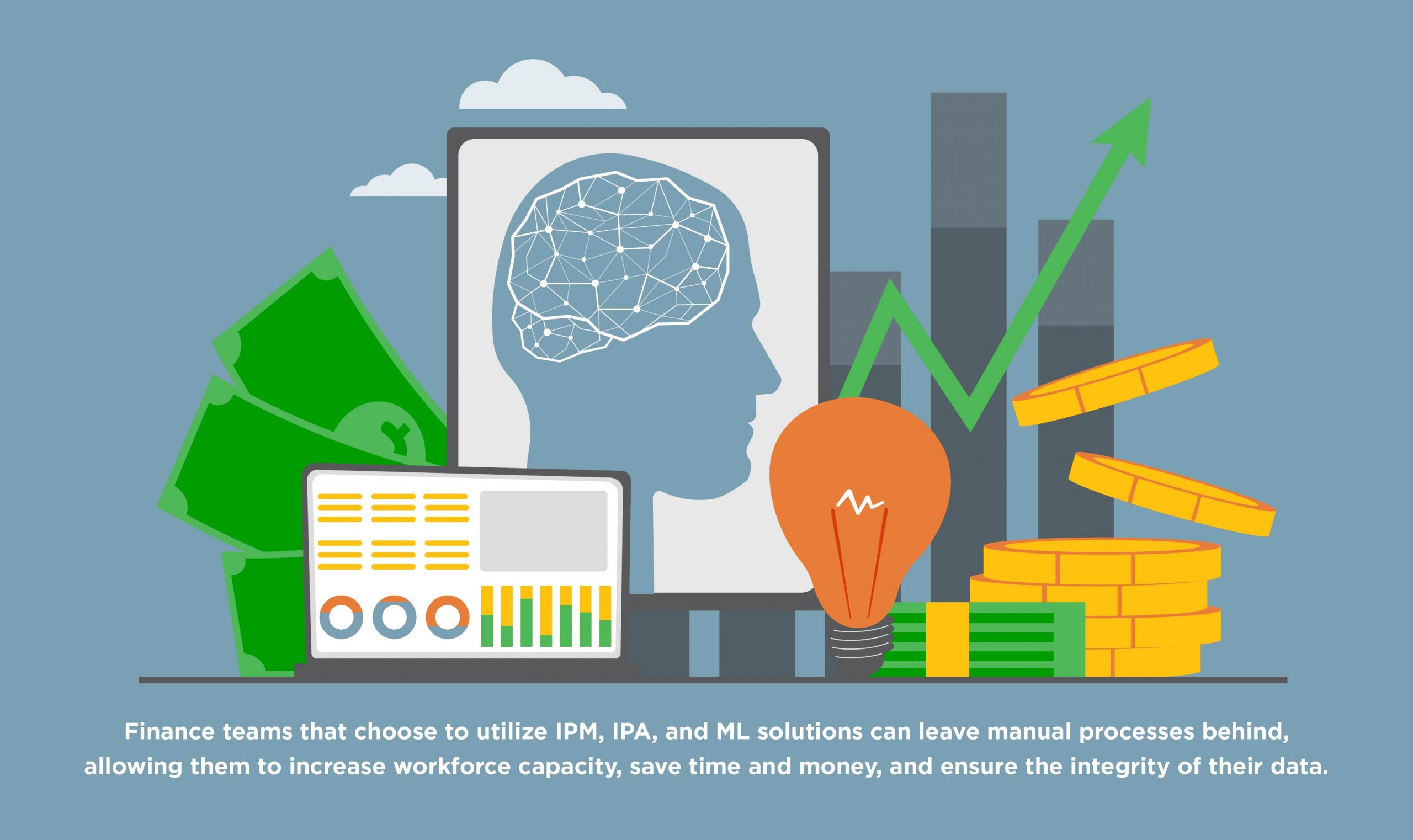Oracle Cloud EPM Creates Valuable Efficiencies by Your Automating Processes
Today’s finance teams understand the importance of future-proofing their systems. That’s why the best finance teams are leveraging artificial intelligence (AI)—specifically robotic process automation (RPA) and machine learning—to manage and automate their corporate financial processes. These types of AI can apply human-like intelligence to machine-performed tasks, such as decision-making and visual interpretation. RPA, for example, is a scripted, software-driven process for streamlining common repetitive tasks. This technology, considered the simplest form of AI, creates valuable process efficiencies for finance.
Oracle Cloud EPM has made significant investments embedding AI and RPA in its Cloud EPM platform under the Intelligent Performance Management (IPM) umbrella.
Oracle refers to RPA as Intelligent Process Automation (IPA), which reflects the fact that it is embedded into the processes, allowing finance teams to automate many of their processes. That, in turn, allows them to benefit from this emerging technology during their everyday finance activities. Cloud EPM offers IPA capabilities to arm finance professionals with the technology to automate manual corporate financial processes, support budgeting and forecasting, and provide accurate insights and reporting.
How finance organizations are using AI/IPM
Adopting AI is an increasing priority for many companies. Finance teams that choose to utilize IPA and machine learning can leave manual processes behind, allowing them to increase workforce capacity, save time and money, and ensure the integrity of their data. Finance professionals are using these capabilities to:
- Close faster: Processes that previously required weeks to complete can now be completed in days, or in some cases, even hours.
- Reconcile balance sheets: Reconciling items is an integral part of the close process. IPA can perform most zero-balance reconciliations automatically, giving finance staff more time to reconcile key items that have a greater impact on the month-end financials.
- Detect anomalies in your trend analysis: Stopping financial fraud can be difficult due to the sheer volume of events and false alarms. Payment processors have turned to RPA to systematically analyze these activities, identifying and alerting system users of potentially fraudulent behavior.
- Connect enterprise plans: Oracle Cloud EPM provides an integrated planning platform to connect plans from Finance, Operations, Supply Chain, Human Resources, IT, Sales, and Marketing. All lines of business can utilize the shared data to create better insights, and the machine learning-driven forecasts help support better decision-making.
- Leverage AI and IPM for predictive insights: Finance teams harness the power of Oracle Cloud EPM to inform short- and long-term decision-making, such as whether to adopt a conservative or aggressive forecast strategy.
- Automate data analysis: Users can also leverage a machine learning model from any data science platform by importing the model into Cloud EPM and accessing its predictions and signals there. (Oracle calls this BYOML: “Bring your own machine learning”)

Charting a smarter course with intelligent insights
Capitalizing on the potential of finance-oriented AI requires the right enterprise performance management (EPM) solution. Oracle Cloud EPM comes with Intelligent Performance Management (IPM) Insights, a set of built-in capabilities that helps unlock new possibilities for finance teams. IPM Insights help you take performance management to the next level through more informed decision-making. Unlike a traditional machine learning platform, which is designed for developers, or a business intelligence tool that depends on existing data to generate insights, Oracle provides predictive insights with data that are optimized for multidimensional planning and forecasting. Oracle Cloud EPM leverages “what-if” analysis and scenario modeling that can improve forecasting accuracy, reduce risk, and slash the amount of time spent on manual data analysis through the power of automation.
Additionally, Oracle Cloud EPM improves the quality of insights, with features such as:
- Forecast variance and bias insight: Uncovers hidden biases in forecasts submitted by planners by measuring the variance between two historical scenarios.
- Prediction insight: Identifies significant deviation in forecasts by measuring the variance between future scenarios.
- Anomaly insight: Helps financial professionals and planners to detect unusual patterns that may deviate from expected results.
With Oracle Cloud EPM, finance organizations can automate the entirety of their business lifecycle, from budget, profit and costing, and long-range planning to line-of-business planning and management reporting. This results in a higher quality of analysis in less time. With this new freedom, teams can focus on tasks dependent on human input. In short, Oracle Cloud EPM complements your finance team’s abilities to perform their roles more efficiently.
Inspirage is an experienced Oracle partner that has successfully guided many EPM and ERP implementations, supply chain transformations, and numerous other ambitious projects for customers across a diverse range of industries. Contact our team to learn more about how we can help your finance organization harness the power of IPA and machine learning in the cloud.